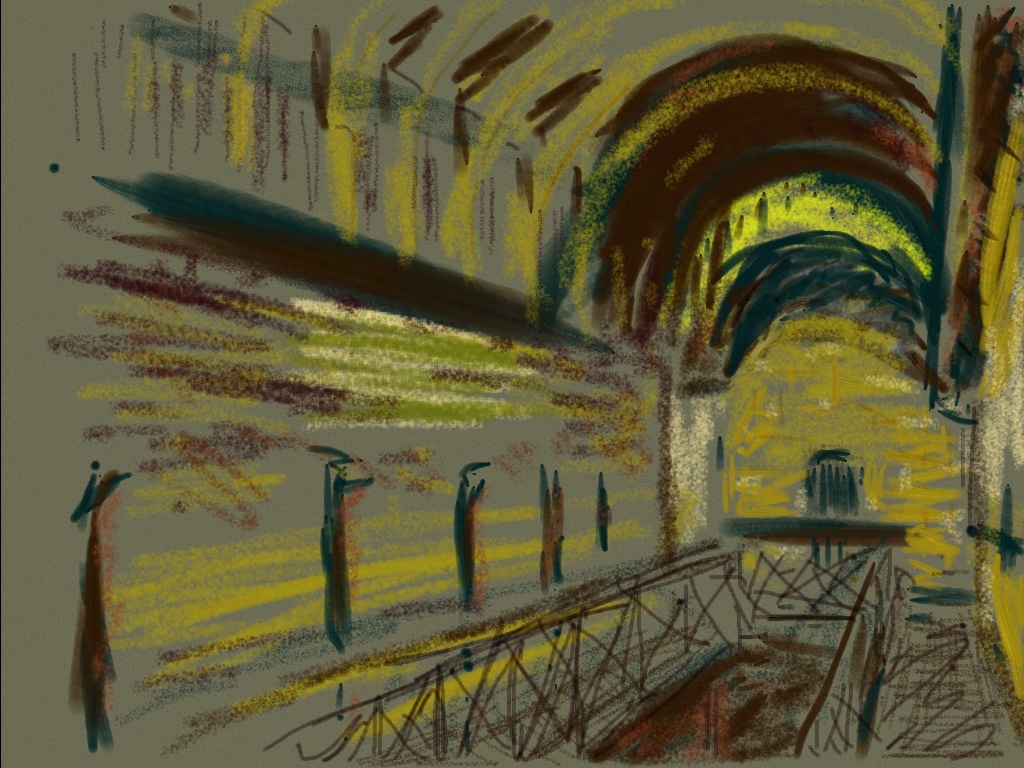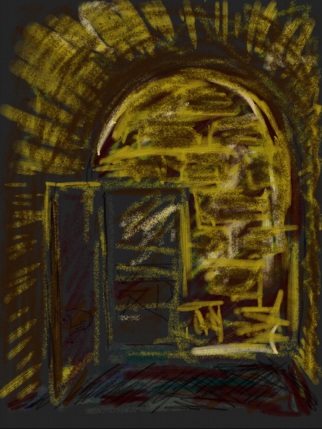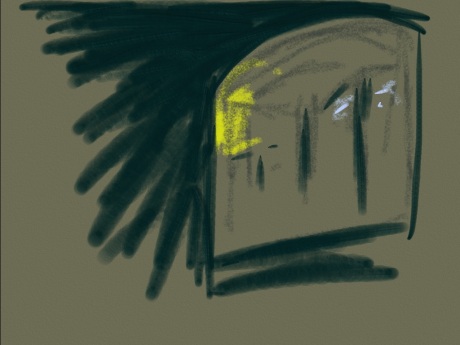Mum reckoned if anything that got dropped got picked up within five seconds it’d be alright. It started, I reckon, with spat-out dummies. Lollies, and food in general, followed. A quick wipe and right as rain. At footy games she took the same pick-’em-up-quick approach. ‘You’ll be right, Matty. Up you get. Keep goin’, Mate.’ And on the morning after my diagnosis she was on my doorstep, all smiles. ‘No point gettin’ down about it,’ she said. ‘I’m taking you shopping.’ The five second rule again. Christ knows – I don’t even like shopping.
Loathing
After ten years even a strong marriage can become strained. That was no excuse. I found myself interstate on business, staying in that part of town where women can be bought on street corners. She seemed a little lost among the hard-bitten, the brazen and the desperate.
She told me where to drive. By the time we got there her words were slurring, she was having trouble focusing. It’s nothing, she said. I let myself believe her.
Later I offered to drive her to hospital. She didn’t want to go. I took her instead to a flat at the back of a rundown block, opened the door with her key, laid her on the couch and left. I told myself I didn’t want to get mixed up. Besides, I’d offered. Hadn’t I?
Next morning the radio reported an attack. A young victim. A man being sought. I had no courage for admissions. I could have helped. I could have told police what I knew. But I flew home instead.
Before I could knock, my wife had the front door open. She was clasping Rebeccah tight to her. ‘What have you done, Leigh?’ she said. ‘What have you done?’
Helpin
There was nothing Col liked more than a good situation. Something he could throw himself into. Make a difference. Like this mum here. She’s got a kid screamin in the back and she’s totally boxed in by 4×4’s parked close either side. Col props his bike on its stand and wanders across, waving in the woman’s direction. He walks to the back corner and indicates how much space she has to work with, which isn’t much. He brings his hands together as she edges back. Just before she touches the big car’s bull bar he whistles. Holds his palm out like a traffic cop.
As he walks to the front corner he makes a face at the littly. It turns the kid’s screams to gigglin. All in a day’s work. He repeats the hand gestures first at the front then again at the rear. Almost done. He flashes a thumb’s up and positions himself again for the final maneuver. You’re right. Slowly now. Keep it comin. Keep it comin. You’re good.
Metal and plastic splinter. The passenger mirror shears clean off. Col smiles toothlessly as he recovers his bike. Bloody genius. Nothin’s as sweet as a good situation.
Seven
Carly lost three fingers in a
belt spinning so fast she thought
the machine was off. She always
wears gloves. Plays tricks on children.
Friends admire her courage. She forms
a fist with her good hand.
A new site worth getting to know
I’ve just launched a new site focusing in more detail on microfiction. I hope that regular smallstoriesaboutlove readers will take a look. I’ll continue to publish stories here and use this site as the experimental writing space it has become. But I want to delve a little further into the theory and practice of microfiction as well as creating a more engaging on-line presence for my own broader practice, hence the new site.
The new site is called Big Story Small. It can be viewed at bigstorysmall.com.
I’d love to get some feedback and please, if you’re interested in very short fiction, consider following bigstorysmall – I guarantee there’ll be plenty of great posts, news and information for writers and readers alike.
You can also now follow me on Twitter, where I’ll be posting Twitter-sized stories, some new and others rewritten and edited to suit that format. My first Twitter story has just been published at @bigstorysmall.
I hope smallstoriesaboutlove readers enjoy these new sites.
What you wish for
Dad and Liz, which is what I call Mum ‘coz she hates ‘Mum’, like it makes her sound old, as if she isn’t, but that’s her problem, are having another big fight downstairs. Liz is on about money again. About why other women in our street have got this and that and why they go places on holidays. ‘Actual places,’ she says, ‘on planes,’ like that ‘ll hurt him big time which is what she wants. But he just goes, ‘Planes. Really?’ Then there’s a crash and another plate hits the wall. And I sneak into their room which is where I’ve always gone when they’re like this and I start going through their drawers. I don’t know why but it makes me feel better looking at grown up things to remind me they’re more grown up than me and so far they haven’t actually messed me up too bad. And even Mum seems like someone soft you could like when you’re looking at her creams and her frilly things and I can block out the racket they’re making.
After I look through Mum’s stuff for anything new, but it’s just the usual goo for skin and corns, which is hard bits on your feet, and bras and pills to stop babies and stuff like that I go round Dad’s side of the bed and there’s a big envelope on his table and it’s been opened and I think wouldn’t it be good if it said, Dear Mr Harrison, you got that divorce you wanted and you can take Ryan but he’ll have to see his mum on weekends, something like that ‘coz that would be the best thing I reckon. But I know about letters and I know it’s not right so I don’t touch it and I look through his drawers instead and there’s the ciggies he’s not supposed to smoke and a whole lot of loose change and old watches and rubbers to stop babies and downstairs in the kitchen there’s another crash and shouting and my eyes keep going back to the envelope and it gets so as I have to look what’s there ‘coz it might be something like that about starting new just Dad and me so I pull the paper out and it’s addressed to him and it’s from some laboratory and I think maybe he’s sick. Maybe he’s real sick. And it’s hard to read ‘coz I don’t know all the words but half-way I realise it’s about me which it calls ‘the child in question’ and it’s saying something about why he’s not really my dad.
Downstairs goes quiet. There’s footsteps coming up. Usually that’s when I’d run out, fast.
First night (after long years)
She is with me only now.
Court orders behind us, we celebrate
our disentanglement. Her mother will inject
life into other parties. I comb.
Long strokes. She smiles weakly, her
school’s nit notification open beside her.
Real cars
There was a time, Don remembered, when V8s ruled the highways. Proper cars. Valiants and Falcons. Chargers. Now the streets were clogged to a standstill with putt-putts. That’s what he called them. And what good had they done. Bugger all for all he could tell. The summers were hotter than Hades. Winter was cold but dry. The whole city drank recycled piss for God’s sake. And if a fella like him wanted to, if he hadn’t had his licence taken from him years ago, he couldn’t drive a decent car.
Lenny arrived. The kid was a disappointment. He worked for the government for a start, some sort of scientist. It was Lenny and that Clara who’d put him in this place.
Against my will, Don grumbled as Lenny straightened the photos on his dresser. What sort of family…
You been taking your pills? said Lenny.
Those pills ‘ll kill me, said Don.
You wanna live like this? said Lenny.
Whadda you think. You tell me.
Take the pills Dad, said Lenny. They’ll either kill you or make you feel better. You can’t lose.
Bugger you, said Don. He knew the score. He’d been at the home longer than anyone. He’d watched the others arrive like him, defeated. He’d seen them come over all smiles for a while. He’d watched them getting taken out.
Happy, happy, happy, die, he said.
You’re making it up, Dad, said Lenny.
Am I? said Don. And you with your government job. Don’t talk to me about making things up.
He closed his eyes. His head filled with the scream of a big donk hauling steel from nought to a hundred in the time it took to smell rubber burning on tarmac. All the good things were gone now. Outside the last of the dying pine trees was being taken out. They’d planted cactuses.
Beyond this
Today is the final day of my Old Melbourne Gaol residency.
Beyond this
The sun is not as I’ve been remembering, but hangs forlorn, choked brown by plumes from smokestacks that have gone up all around. I’d imagined it, at least, would greet me like an old friend. But it is wary. By noon it has taken itself off behind low clouds, and them behind the smoke. The streets I knew have turned to walls themselves and this world seems but a different grey. People hunch. Birds do not sing. I know a place where men and women and creatures swagger beneath skies that are rarely anything but blue. It will cost me a pretty penny to get back there. So it is I spend the afternoon of my release planning my escape.
Insurance
Labourers are a dime a dozen. Lonnie knows he’ll have work in good times but only his wits when jobs are scarce, which is trouble. Lonnie knows. He knows about walls like these. Their familiar shape. He knows about exercise yards.
Carter, the foreman, is a hard man. Lonnie half considers a change of plan but now’s not the time. He makes a note of the stones, fires a glance either side, then draws a blade from his sleeve. He lays it at the edge of a thick line of mortar that he’s mixed soft,
Just in case, he mutters as he trowels the mix quickly across. North wall, four lines up, five blocks from the right. The job is done. Carter can wait.
Nest
The day I scratch the mark that marks two years
a bird arrives to tug a weed that spreads
between my bars, for nesting. Lest it disappears
I offer it some tattered blanket threads.
Now threadbare, worn to nothing, five years hence
that blanket offers no warmth in the chill
but warmth comes daily when my bird descends
now to my bunk, our trust so that it will
exchange for strands such gifts as please me best.
It brings me shiny things. Some buttons bright,
some coins the guards are happy to accept,
some bottle tops that glisten in the light,
some nails, which I sharpen to a point,
some bullets from a lazy copper’s joint.
For Luck
A man has the right to expect certain things. He has a right not to have his work put at risk by the equipment he uses. That’s my belief. I take a pride. I’m up with the latest literature. Before each job I check and recheck everything. I do the calculations three times over. I leave nothing to chance. So why is it that now, with the moment so close at hand, the governor proudly shows me the new rope he’s got up for me.
It’s four strands, I says.
Is it, he says.
Aye.
Rope’s rope, he says.
Three strand’s what I need, I says.
One more for luck, he says.
Don’t tell me about luck, I says.
There but for the grace of God, he says, and he orders me to attention, and while I wait, footsteps ringing slow on the galley iron, I do the sums in my head and then I says to the fella as he passes, sorry, which I hoped I’d never have to say. And when he drops I turn away.
Cobbles and dust
If they flogged me it would be no worse, but I’m a woman so they won’t. They haven’t the guts. Instead, they give me the shirts from the men’s wing and they tell me to wash away the blood and salt and the fluid like custard that seeps from the wounds. And when I can’t clean them, ‘cos there aint nothing can clean that stain, they take away what they call my privileges. Ha. And they march me between the cells, slowly, because they think the words will sting. They strip me and spit on me and throw me in the confinement cell. For my own good, they say. But what’s the use, they say, because no good ever came to a baby farmer like you. Lower than a dog. Shows what they know. Those children was marked before they was ever brought to me. Most before they was born, I reckon. The guards think they’ll break me. But bluestone blocks for dirty lanes or prison walls is all the same. Cobbles and dust; all I’ve ever known.
The caretaker’s story
They closed the place after the riot. Within ten years the roof in the north wing had collapsed. After the fires I was hired to stop the vandalism and the theft. I chased out squatters and bums and freaks looking for kicks. I rehung the old doors and refitted iron bolts to them. Once the place was secure the job was easy. A bit of maintenance during the day, then I’d do my rounds before settling into my quarters for the night.
I had it pretty good until the day the locks jammed. Every one closed up as tight as if there never had been an opening. The power and phone lines went down. And from the exercise yard the dull echo of a slow march I’d grown used to turned to chaos and cries of vengeance.
The methodical mind
There are many ways information can be acquired. It can be bought or stolen or had by intimidation. It can be discovered, either by accident or design, or, most commonly, by the fortuitous combination of both. It can come in a dream.
I have taken three years to learn, in various ways, the following things; the habits of each and every guard and each and every inmate, the design of the buildings right down to the plumbing, the best ways to hide small tools, the manufacture of rope from sheeting scraps, a technique to muffle noises in my cell, the exact timing of shift changes, and the recipe for a soft paste indistinguishable from the mortar between the stones.
Tonight I begin tunnelling. I do not fear the dogs or guns. I do not fear the deadly drops from the outer wall. I do not fear the loose lips of those whose knowledge came hardest, for they have been silenced. The only thing I fear is that I do not know what it is I might have missed.


